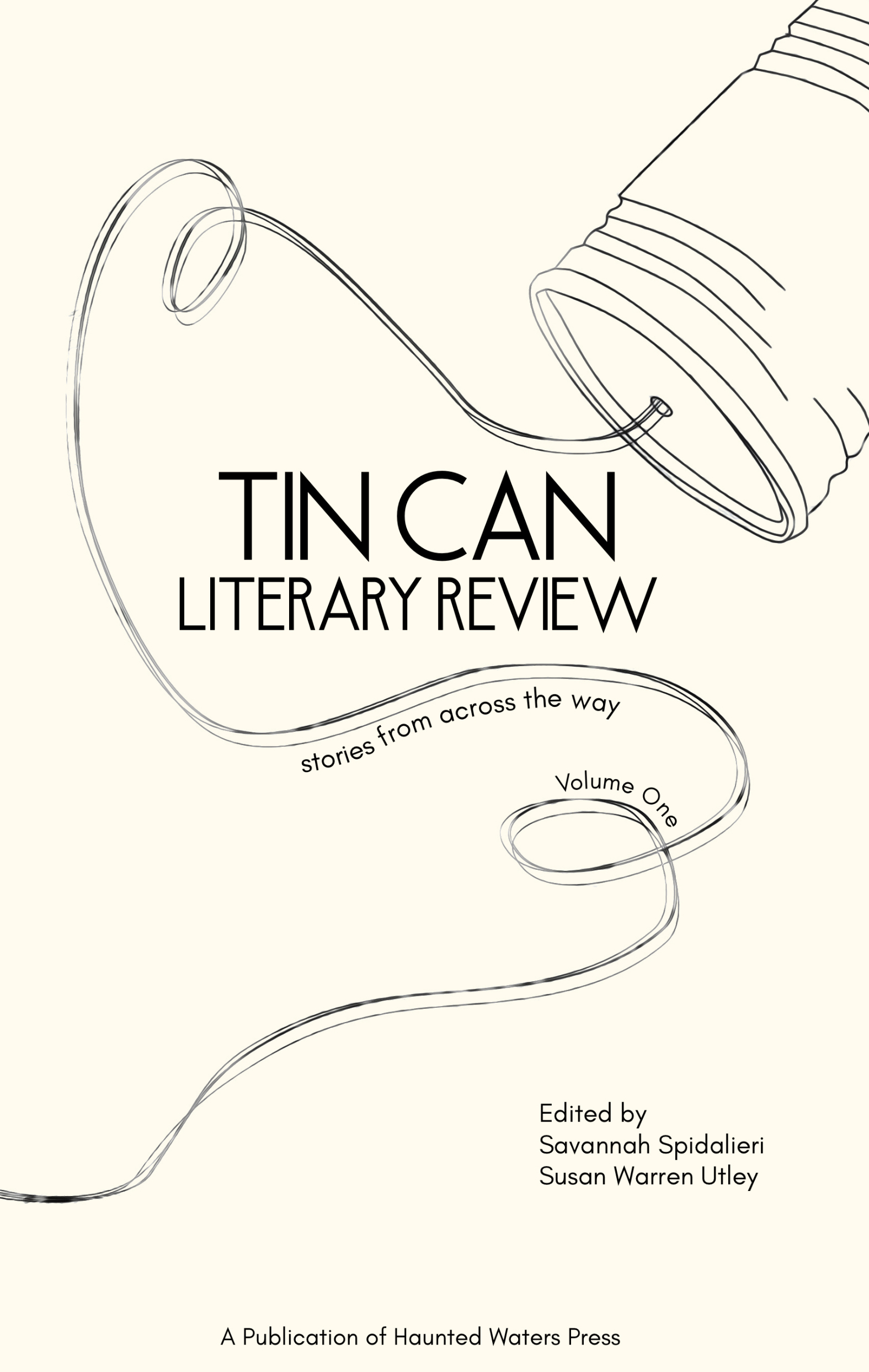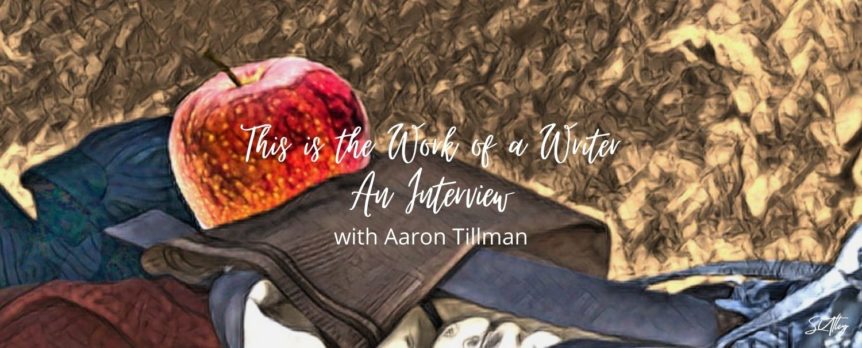An Interview with Aaron Tillman
Welcome! Today we chat with HWP Contributor Aaron Tillman. Aaron's short story Soiling the Tree of Knowledge is featured in the 2021 debut of Tin Can Literary Review, Volume One. Enjoy!
Those are really the operative words—so many joys and challenges!—but in my experience, most relate to the relatively short length of the story. One of the great joys is that you can create a complete work that can be consumed in a single sitting: over a cup of coffee or in the bath or before bed. And just like that, this complete thing is living in the mind where it can hang out on its own, or interact with other, fully or half-formed things, perhaps even influence the way you see or think. I also enjoy reading stories aloud and hearing stories read aloud—joyful on either side! Of course, there are many challenges before anyone can read or hear a fully formed story. For me, it's often about balancing the showing and the telling. In most stories, there are interactions and experiences that really should be shown, so a reader can connect with characters, imagine circumstances, feel tension, and care about what takes place. But space and pacing are real concerns, so some encounters and background details need to be told, so readers have enough context to understand the weight of what is taking place. Tell too much, and the reader won’t feel as connected; show too much, and the story might not move (and might be too long for the genre). Finding that balance can be a joyful challenge.
Is there a particular piece of writing or an author you feel has influenced you most as a writer?
There are many, of course, but I’ll cheat and name two novels that work in similar ways and have helped me with the challenges mentioned above: Jennifer Egan’s A Visit from the Goon Squad and Hannah Tinti's The Twelve Lives of Samuel Hawley. Both of these novels are comprised of chapters that can work independently as short stories. In both cases, characters and circumstances must be introduced fresh and still cohere with the other chapters. Both are astounding in their ability to show enough to feel connected yet tell enough to feel informed. They’re instructive and enormously enjoyable. I’ve read both multiple times, and have really tried to study how they allow a reader to know new characters (or the same characters at different times in their lives) so quickly and so deeply. It helps that they’re both brilliant writers.
Things move slowly, but it doesn't mean they aren't moving. Never stop reading, writing, and searching up random things online—this is the work of a writer, even when it feels like procrastination.
—Aaron Tillman
Do you have any go-to books about writing or the creative process? What's on your bookshelf?
There are many books on my shelf, but there are only a few I turn to often for insight on the creative process. Along with the Egan and Tinti novels mentioned above, Tim O'Brien's collection The Things They Carried, and specifically his story "How to Tell a True War Story," have taught me more about fiction writing than most of what I've read about the writing process (but there's a lot I haven't read). That said, there are two books on writing that I have dog-eared fairly heavily: Why I Write: Thoughts on the Craft of Fiction has some wonderful takes on the process by a range of incredible writers--including Mary Gaitskill, David Foster Wallace, Terry McMillan, and Denis Johnson--and Alice LaPlante's The Making of a Story is a terrific book that works wonderfully well in the classroom. And since I mentioned Tim O'Brien above, I should add that his essay "The Magic Show," from the anthology Writers on Writing, is incredible. Among other things, he suggests that a "satisfying plot … involves not a diminution of mystery but rather a fundamental enlargement" (181). For me, that's about as liberating and exciting as it gets!
What is your workday like as a writer?
I try to write or have writing in mind as often as I can--every day, if possible--but I don't always do that at the same time or in the same way. When the stars align (empty home, few pressing responsibilities, etc.), between 8am-12pm and 4pm-6pm are times when I tend to have the most energy and focus. They also coincide with the times I drink the most coffee. During these stretches, I'm not necessarily writing non-stop, but reading, revising, brainstorming, and browsing the web for essential items and information (did you know that a llama can spit over 10 feet? or dehydrated coconut chips make terrific, high-fiber dog treats?). But when the stars are not aligned quite as well (i.e. most of the time), I try to steal moments before life forces me to turn my attention elsewhere. I write down notes on the fly or yell into my phone as I commute. Then late in the evening, when the living space has settled down for the night, I try to decipher and reflect on the notes I may have scribbled or yelled into a flawed dictation app, so I can give myself something to shape and develop either in the moment or in the morning. But I like to have something in progress (and usually do), so I'm prepared when those wonderful windows open up.
Let’s talk first drafts. Do you compose on a computer, or are you a pen and paper writer?
Really, all of the above. I always have paper and pen with me, and I am often scratching out random thoughts or observations when I am not in front of my computer. When I am home, I typically type out what's on my mind or transcribe my pen/paper scribbles or phone dictation notes (see above) into a document. I tend to write a lot while building a story. These include elaborate backstories for central and peripheral characters, dialogue that strikes my ear as juicy, lines that I like, descriptions of places where I imagine action could take place. For the story published by Haunted Waters, I had a scrap of paper on my desk that just said "Cortland's a bullshit apple!" And the story sort of grew from there. But almost always, I find myself trying to paste parts together that seem to belong, and once that's done, I print the draft out and see what makes sense. The drafting can seem endless, but most of the time, with enough persistence, I usually latch onto a coherent narrative that aligns to some degree with whatever I was imagining to begin with. I keep adding, subtracting, and modifying until a worthy story is born.
Describe your editing process.
Endless. But in a good way. Knowing that editing is an essential part of the process frees me up to write with fewer inhibitions. For the specific process, I start by editing whatever notes or drafts I may have written prior, so I have the details in my mind, and I can find a way to keep moving things forward. Once a whole draft is complete, I print it out and edit on the page, then transcribe and modify those edits into my working document. This process continues until the story feels complete. Then I usually send it out somewhere, and the vulnerability of that act almost always sends me back to the story with more nervous eyes that catch things I missed when I "finished" the story the first time. And on and on until a wonderful press such as Haunted Waters saves me from myself, and I can move on to the next thing.
How much of yourself do you allow to flow into your characters?
There are parts of me in all of my characters, and I expect that's true of most writers, but the details that may seem most autobiographical are often used to help ground the story with concrete and specific details. Once the story is anchored and feels real, my imagination is freed up to consider wilder, more complex circumstances and interactions (my life's not especially interesting). Oftentimes, the further away from me a character may seem, the closer to personal truths they get. I find this is especially true with the more magical stories I write. The central character in the title story of my first collection (Every Single Bone in My Brain) has a supernatural level of electricity flowing through his body, so he is literally (in the context of the story), and at times lethally, shocking to people. His condition forces him to live and work in relative isolation, yet he still has very normal, natural desires, and a highly charged imagination. When writing the story, I wanted to explore how such an internalized sense of difference could influence self-perception and behavior. There are few characters who have exhibited more of my fears and behaviors than this fantastical character.
What words do you live by? Do you have a personal motto?
There are a few things that might qualify here (in a writing context, at least): writing is generative. This reminds me to write even when I don't have anything specific in mind. The writing will bring it out. And this leads to a related motto-like phrase: believe in the process of writing. It's messy, but it usually has a way of revealing/organizing itself, especially if you take the time to work at it. Finally, write where and when it's hot. If I'm inspired to write something, I do, whether it relates to what I'm working on or not. If I'm steeped in a story, and I have an idea for something that's out of sequence or possibly outside the parameters of the story, I try to flesh it out in the moment, and then see if/where it fits later.
If you could tell your younger writing self anything, what would it be?
Things move slowly, but it doesn't mean they aren't moving. Never stop reading, writing, and searching up random things online—this is the work of a writer, even when it feels like procrastination. The effort to "find your voice" is misleading. It's not so singular. Remain open to influences and allow yourself to continue to try different things in different ways. And maybe shave a little more often.
What comes next for you as a writer?
Thanks for asking and for all the thoughtful questions—this has been a valuable and enjoyable experience, and I am grateful for the opportunity to reflect on the process of writing! I have some exciting things on the horizon. At the beginning of next year (January 2022), my second collection of short stories, Consolations Miracles, will be published by Gateway Literary Press. I also have a recently completed novel, which is a magical realist mystery, of sorts, but also a work of literary fiction. I’m hoping to find representation or some other pathway to publication for that and doing my best to enjoy it all!


Lightning Round with Aaron Tillman

ABOUT THE AUTHOR
Aaron Tillman lives in Boston and teaches writing at UMass Amherst. His short story collection, Consolation Miracles, is forthcoming from Gateway Literary Press (January 2022); his book of critical nonfiction, Magical American Jew, was published by Lexington Books in 2018, and his short story collection, Every Single Bone in My Brain, was published by Braddock Avenue Books in 2017. He received the John Gardner Memorial Prize in Fiction from Harpur Palate, a Short Story Award for New Writers from Glimmer Train Stories, and he is a two-time Pushcart Prize nominee.
Share this Post

